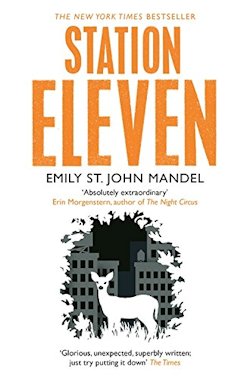The “lost world” of Station Eleven, our world, is not recovered—it can never be that, alas—but it is remembered in Emily St. John Mandel’s aching account of the apocalypse: a tale of two times which takes as its basis the affairs of the folks affected, both before and after the fact, by the actor and philanderer Arthur Leander.
The man himself dies of a massive heart attack in the first chapter, passing away onstage during the climactic fourth act of a performance of Shakespeare’s King Lear. Jeevan Chaudhary, an apprentice paramedic in the audience that evening, does his level best to save the day, but Arthur Leander is already lost: the last celebrity to fall before the Georgia Flu takes them all.
Child actress Kirsten Raymonde also witnesses this, but remembers precious little of it twenty years later, when the second phase of Station Eleven takes place. Some might think her disconnect a blessing—“the more you remember, the more you’ve lost,” after all—yet Kirsten has searched ever since for ephemera of everyday existence before the fall; especially for ephemera connected to Arthur Leander, and to the kindly stranger—the same soul who attempted CPR on the aforementioned actor—who was there for her that night.
To that end, then—to find proof of the past—Kirsten has become a member of the Traveling Symphony, a band of roaming revellers:
The Traveling Symphony performed music—classical, jazz, orchestral arrangements of pre-collapse pop songs—and Shakespeare. They’d performed more modern plays sometimes in the first few years, but what was startling, what no one would have anticipated, was that audiences seemed to prefer Shakespeare to their other theatrical offerings.
As the man learning the lead role in the ragtag troupe’s rendition of King Lear puts it, “people want what was best about the world.” The world that was, that is; another has risen in its stead, however:
Civilisation in Year Twenty was an archipelago of small towns. These towns had fought off ferals, buried their neighbours, lived and died and suffered together in the blood-drenched years just after the collapse, survived against unspeakable odds and then only by holding together into the calm, and these places didn’t go out of their way to welcome outsiders.
But sometimes—in the mode of the motto taken from Star Trek: Voyager and scrawled on the Traveling Symphony’s lead caravan—sometimes, as Seven of Nine said so memorably, “survival is insufficient”: a lesson Kirsten and company would do well to remember when they cross swords with a self-styled prophet in St. Deborah by the Water. “We are the pure,” he preaches, and “that flu was our flood.”

Unwilling to make waves, they leave said settlement just as soon as they see its sinister side. What they don’t know then, though, what they don’t discover until the damage is done, is that a twelve-year-old has stowed away with them—a child bride the perverted prophet badly wants back.
All this is but a small part of the plot of Station Eleven, presented linearly, as if it were a thriller. It isn’t. It certainly has elements of the several such novels the author has composed in the past, but rather than twisting her narrative into torturous knots for the sake of some tension, Mandel slowly explores the magic of the mundane. In a lamp-lit room in the aftermath of a heart-breaking party, two of Arthur Leader’s ex-wives share a silence that is as moving as anything in this tremendously affecting text:
Miranda sits on the floor beside Elizabeth, whose breath is heavy with wine, and she leans back until she feels the reassuring solidity of the door frame against her spine. Elizabeth, who is crying a little, bites her lip and together they look at the sketches and paintings pinned to every wall. The dog stands at attention and stares at the window, where just now a moth brushed up against the glass, and for a moment everything is still. Station Eleven is all around them.
Station Eleven—which takes its title from a comic book-to-be poor misbegotten Miranda pours her whole heart and soul into; the same comic book the so-called prophet holds dear decades later—Station Eleven finds such meaning in these moments of minutiae, such incredible intimacy, that the reader rarely recalls the apocalypse of its premise. The author takes pains to keep it off the page in any case.
The moments Mandel is more interested in—to the book’s benefit, to be sure—do not exist in isolation either, though they frequently appear to. Eventually, connections are sketched between them—connections that draw one character into the orbit of another and conjoin this civilisation to that—but even these don’t come easily.
Station Eleven features a great many moving pieces, and its pace is… not plodding, precisely, but rarely rushed. Indeed, there abounds “a feeling of moving in slow motion, like walking underwater or in a dream” such that it is “necessary to concentrate carefully on each step.” But patience, please, because what takes shape, in time, is a truly transcendent Iñárritu-esque epic about remembering and forgetting, complete with impeccably crafted characters and an abundance of love for the little things that make life worth living.
Little things like this book, in truth.
Station Eleven is available now from Knopf Doubleday in the US and Picador in the UK.
Niall Alexander is an extra-curricular English teacher who reads and writes about all things weird and wonderful for The Speculative Scotsman, Strange Horizons, and Tor.com. He’s been known to tweet, twoo.










